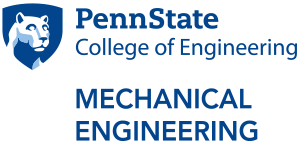
ME Knowledge Lab
In 2021, the department reimagined its undergraduate lab experience by transforming the Reber Building basement into the ME Knowledge Lab—a space for students to receive the most cutting-edge and impactful educational opportunities possible.
The redesigned ME Knowledge Lab includes:
- Rapid prototyping equipment
- The Toolbox, a tool rental facility
- A multidisciplinary experimentation space
- Open collaboration space
- Instructional space
- Virtual reality experiences
- The Autonomous Vehicle Lab
Prior to the renovation, the basement was a 5,700-square-foot space with limited student use. Through critical support from our alumni, industry partners, and friends, the ME Knowledge Lab is a bright, inviting hub for learning innovation. The space is now the epicenter for undergraduate laboratory classes and a well-equipped maker space, enabling students to bring their imaginative prototypes to life. The 180-degree transformation resulted in a dynamic, forward-thinking space for students to attend lab classes, work hands-on with the latest technology, and collaborate with their peers.
ME 435: Mechanical Engineering Systems Lab
In the ME Knowledge Lab, students complete the new, required three-credit lab course, ME 435: Mechanical Engineering Systems Lab. Using the cutting-edge laboratory, they explore fundamental mechanical engineering knowledge, through the lens of solving real-world problems. ME 435 was piloted in 2021-22 and fully launched to all undergraduate mechanical engineering students as a required full-scale course in 2022-23.
In ME 435, students apply the five core mechanical engineering fundamentals, heat transfer, fluid mechanics, solid mechanics, material, and chemistry to solve twenty-first century problems surrounding topics including, but not limited to:
- Sustainability
- Big Data
- Advanced Manufacturing
- Autonomy and Robotics
- Energy
This approach encourages higher-order thinking skills, instead of "cookbook recipe" style experiments.
Sample projects
Deciphering Human Activity with Smartwatch Sensors and Maching Learning Algorithms
Students work to understand how a smart watch classifies human activity. By reviewing basic statistics for data analysis, applying statistical knowledge to extract features from data, and utilizing machine learning classification techniques, they learn to understand the data input and output relationship.
Pre-heat Lithium Ion Batteries for Electrical Vehicles
Another example is a module on how to pre-heat lithium ion batteries for electrical vehicle in cold weather. Li-ion batteries experience a drop in performance in cold temperatures. Tying the lab to this challenge, students apply heat transfer knowledge, including conduction and convection, to design strategies for preheating batteries in cold conditions. They then compare and explain the difference between numerical prediction and experimental results.
-
ME Knowledge Lab Education Outcomes
- A New Approach to Equip Students to Solve 21st-Century Global Challenges: Integrated Problem-Based Mechanical Engineering Laboratory American Society for Engineering Education
- A Laboratory Course Design Strategy to Increase Student Confidence: Connecting Material Testing Standards to Course Material and Real Applications
- Prompting by COVID-19 to Rethink the Purpose of Engineering Laboratory Education–Develop Practical Competence to Solve Real-World Problems-AEE Advances in Engineering Education
-
Undergraduate Student Resources
- Careers and Internships
- Global Engineering Experiences
- Organizations and Clubs
- Research and Teaching Opportunities
- Scholarships and Awards
- Student and Alumni Mentoring Program


